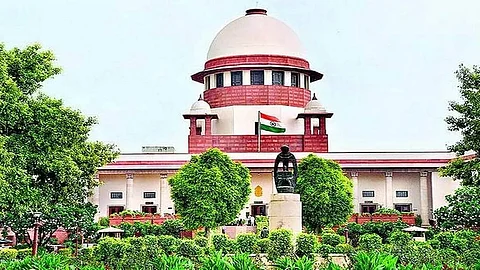

New Delhi | The Supreme Court on Friday stayed an order asking a rape accused's wife, employed in the US, to remain in India as a "collateral" if he wished to travel abroad for a job.
A bench of Justices Sanjay Kumar and Satish Chandra Sharma issued notice to the Rajasthan government in the matter on the appeal filed by a software engineer, accused of raping a woman on the promise of marriage.
The top court further directed the man to deposit Rs 2 lakh as surety for foreign travel.
Advocate Ashwani Dubey, appearing for the engineer, submitted that the wife was neither an accused nor a party to the case.
He said no notice was issued by the Rajasthan High Court and yet it passed an order restraining the petitioner.
"The wife, who is neither accused nor heard, is restrained from travelling abroad, purely to offset a hypothetical apprehension that the husband will abscond," Dubey argued.
The plea said the high court, in a clear violation of the "procedural impropriety" and without hearing or impleading his wife, who is currently employed in the US, and ignoring the fact that she was not a part of the criminal case, directed her to remain in India.
It was further argued that the high court direction was "erroneous" and violative of the fundamental rights under Article 21 of the Constitution.
The direction was stated to suffer from procedural irregularity and legal perversity, having been passed without affording a hearing to the person affected.
"The petitioner is an Indian passport holder and an Indian citizen and not the citizen of any other country and he will be under the control of Consulate General at USA and there are no chances of his absconding as he is willing to go abroad to earn his livelihood on work visa and therefore, there is no question of his absconding," the plea said.
The bench was informed that the petitioner would travel for a specific period and ready to state on oath that he would be available for trial as and when directed.
"There is no question of delay in trial and also there is no question of his absconding," the plea added.
The man was booked on rape charges by the Christianganj Police Station in Ajmer after it was alleged that he met a woman on a matrimonial website and maintained a close acquaintance with her for four years on the promise of marriage.
Section 69 of BNS deals with the offence of "sexual intercourse by employing deceitful means, etc.", and defines deceitful means to include "false promise of employment or promotion, inducement or marring after suppressing identity".
Apprehending arrest, he moved an anticipatory bail application, which was allowed.
He then moved an application before the trial court to allow him to go abroad for a job.
The trial court dismissed his plea following which he challenged it before the high court.
The high court allowed him to go abroad but imposed a condition that his wife must remain in India.
